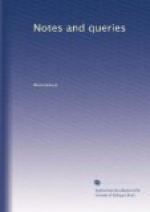NOTES.
Traditional English ballads.
The task of gathering old traditionary song is surely a pleasant and a lightsome one. Albeit the harvest has been plentiful and the gleaners many, still a stray sheaf may occasionally be found worth the having. But we must be careful not to “pick up a straw.”
One of your corespondents recommends, as an addition to the value of your pages, the careful getting together of those numerous traditional ballads that are still sometimes to be met with, floating about various parts of the country. This advice is by no means to be disregarded, but I wish to point out the necessity of the contributors to the undertaking knowing something about ballad literature. An acquaintance with the ordinary published collections, at least, cannot be dispensed with. Without this knowledge we should be only multiplying copies of worthless trifles, or reprinting ballads that had already appeared in print.
The traditional copies of old black-letter ballads are, in almost all cases (as may easily be seen by comparison), much the worse for wear. As a proof of this I refer the curious in these matters to a volume of Traditional Versions of Old Ballads, collected by Mr. Peter Buchan, and edited by Mr. Dixon for the Percy Society. The Rev. Mr. Dyce pronounces this “a volume of forgeries;” but, acquitting poor Buchan (of whom more anon) of any intention to deceive, it is, to say the least of it, a volume of rubbish; inasmuch as the ballads are all worthless modern versions of what had appeared “centuries ago” in their genuine shape. Had these ballads not existed in print, we should have been glad of them in any form; but, in the present case, the publication of such a book (more especially by a learned society) is a positive nuisance.
Another work which I cannot refrain from noticing, called by one of the reviewers “A valuable contribution to our stock of ballad literature”? is Mr. Frederick Sheldon’s Minstrelsy of the English Border. The preface to this volume {50} promises much, as may be seen by the following passage:—
“It is now upwards of forty years since Sir Walter Scott published his Border Minstrelsy, and during his ‘raids,’ as he facetiously termed his excursions of discovery in Liddesdale, Teviotdale, Tyndale, and the Merse, very few ballads of any note or originality could possibly escape his enthusiastic inquiry; for, to his love of ballad literature, he added the patience and research of a genuine antiquary. Yet, no doubt many ballads did escape, and still remain scattered up and down the country side, existing probably in the recollection of many a sun-browned shepherd, or the weather-beaten brains of ancient hinds, or ‘eldern’ women: or in the well-thumbed and nearly illegible leaves of some old book or




